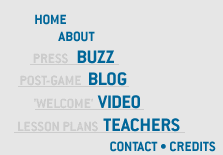LESSON EIGHT:
Preparation and Community
Introduction
With problems piling up and the government apparently unable to help, many communities across the nation are turning inward for solutions. To disengage from dependency on outside resources and agencies, communities have begun to pool resources, develop local capabilities, and police themselves.
Many people, seeing how unprepared society is for a prolonged crisis, are starting to make life changes to help themselves improve the future. Community networks are bringing together the expertise of their members to share ideas, goods, and skills to lessen the effects of the crisis and keep chaos at bay.
Lesson Objectives
Students will:
-
Continue to immerse themselves in the realistic WWO scenario.
-
Examine how communities can work together to help alleviate potential problems, provide security, and work towards resolving a crisis.
-
Consider the individual's responsibility for being prepared for a crisis or emergency.
-
Create outlines of personal and community emergency plans.
- Continue to develop personal strategies predicated upon anticipated events.
- Continue to reflect on the life changes that would occur in a prolonged oil shortage.
Before the Lesson
- Read the Week 26 News Report at WWO: http://worldwithoutoil.org/weekly.aspx?week=26
- Preview the resource materials (links below).
- Prepare your own "in-game" reaction to these latest events unfolding in World Without Oil. How will the latest developments affect you personally? How connected are you to your local community? Blog your in-game reaction and share your blog with your students.
Part 1: Set the Stage
Student Page for this lesson is here:
http://worldwithoutoil.org/metalesson8s.htm
This page summarizes ideas and instructions for students.
- Re-immerse the students: briefly remind them of what's happened previously in a World Without Oil.
- Watch Kal's "Small town Shortage" video: http://www.youtube.com/watch?v=hP_C_Sn66yM
- As a class discuss the ways in which this small town has worked together to address the oil crisis.
Part 2: Take Action
-
Pose the following question to the class: if you could not rely upon the government, what could your community accomplish? In small groups create a list of potential ways your community could survive an oil shortage. In what ways might your community come up short? Review the following WWO posts for inspiration:
Part 3: Lesson Activity
- In their groups, have students review FEMA's "Are You Ready?" web site:
http://www.fema.gov/areyouready/
Then discuss the following:
- What makes a good emergency preparedness plan?
- What level of planning is the responsibility of the individual? Community? Government?
- Some areas have developed strategies to address potential problems, but at this time (March 2008) few have addressed in depth the possibility of an oil shortage. Portland, Oregon, stands out as an exception. Have students review this "Portland establishes task force on peak oil" article:
http://www.energybulletin.net/15851.html
Then discuss either in groups or as a class the value of this program. Could this be a model for the rest of the nation?
- Each group should now create an outline for a personal and community-based emergency plan. The outline should include:
- Tasks they as individuals need to take to be ready
- A list of potential problems that their area might face, and specific issues these problems may cause
- Basic needs and amenities that would be affected by potential problems
- A list of responsibilities of local offices and groups
- Students should either share their outlines with the class or post them to their individual blogs for others to see.
Part 4: Reflect
During a crisis, being properly prepared for an emergency can make all the difference. The same can be said for having a strong network of friends and families that can face a difficult situation together. For this lesson, student reflections should focus on the following questions:
-
How prepared were you for an oil crisis? Your family? How prepared was your immediate community?
-
Who do you have to turn to? How have those people responded?
- What has your community done to in order to limit suffering and other long-term problems?
Part 5: Take It Further
Distribute this to your students:
Being prepared appears to have made a big difference for individuals during this crisis. For others, working together in small and large communities is opening a way to collectively cope and move forward. For today's challenge try one or more of the following ideas:
- Explore your community - take pictures or video of your surroundings, interview your neighbors, and assess your community's ability to handle an emergency.
- Create your own personal emergency kit - using the FEMA or other local resources, stock an emergency kit at your home. Use photos or video to show what's in it.
- Try and find your town's, city's, or county's emergency preparedness plan. How readily can you obtain a copy? Read and assess the plan. Do you think your area is being pro-active enough? Why or why not?
As with all of the challenges, post your findings on your blog. If you can, add photographs, drawings, or video!
Additional Resources
National Standards (McREL)
Overarching (All Lessons)
Standard 44.
Understands the search for community, stability, and peace in an interdependent world
Level IV (Grades 9-12), Benchmark 2:
Understands rates of economic development and the emergence of different economic systems around the globe (e.g., systems of economic management in communist and capitalist countries, as well as the global impact of multinational corporations; the impact of black markets, speculation, and trade in illegal products on national and global markets; patterns of inward, outward, and internal migration in the Middle East and North Africa, types of jobs involved, and the impact of the patterns upon national economies; the rapid economic development of East Asian countries in the late 20th century, and the relatively slow development of Sub-Saharan African countries)
Lesson 8: Specific Standards
Civics
Standard 27: Understands how certain character traits enhance citizens' ability to fulfill personal and civic responsibilities
Level IV, Benchmark 1: Understands the distinction between personal and civic responsibilities and the tensions that may arise between them
Level IV, Benchmark 2: Understands how individuals and society benefit from the fulfillment of personal responsibilities such as supporting one's family and caring for, nurturing, and educating one's children
Level IV, Benchmark 4: Understands the importance for individuals and society of fulfilling civic responsibilities such as assuming leadership when appropriate, registering to vote, and voting knowledgeably on candidates and issues
Geography
Standard 16: Understands the changes that occur in the meaning, use, distribution and importance of resources
Level IV, Benchmark 2: Understands programs and positions related to the use of resources on a local to global scale (e.g., community regulations for water usage during drought periods; local recycling programs for glass, metal, plastic, and paper products; different points of view regarding uses of the Malaysian rain forests)
Standard 18: Understands global development and environmental issues
Level IV, Benchmark 1: Understands the concept of sustainable development and its effects in a variety of situations (e.g., toward cutting the rain forests in Indonesia in response to a demand for lumber in foreign markets, or mining the rutile sands along the coast of eastern Australia near the Great Barrier Reef)
State Standards (All Lessons)
![]()
![]()
![]()
![]()
![]()
![]()
![]()
![]()
![]()
![]()
![]()






